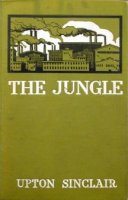 The Jungle by Upton Sinclair (1906)
The Jungle by Upton Sinclair (1906)
I'd heard in high school about this exposé of the Chicago meat-packing industry at the beginning of the 20th Century, but somehow my history teachers and my English teachers didn't collaborate enough to require me to read it. That's probably just as well, as I was operating under the all-too-common theory that if a book was required in school, it couldn't possibly be interesting.
Forty plus years later, I finally read The Jungle, thanks to a suggestion from the Great Courses' Turning Points in American History. Contrary to my expectations, I found it riveting, very difficult to put down. (Whether I would have found it so in high school is another question, and I don't know the answer.) It's depressing enough, following the Lithuanian immigrant protagonist as he and his family are crushed by the dark side of the Industrial Revolution, the unrestrained and unregulated industrial monopolies, and the rampant immigration that encouraged the view of human laborers as expendable. But it's a gripping story, which makes the end of the book all the more distressing. I knew better than to expect a happy ending, although a hopeful one would have been nice. I was expecting a tragic ending, and certainly there's plenty of tragedy to go around. But The Jungle never ends. The protagonist discovers Socialism, and after the reader is led through pages of Socialist diatribe, the book simply ends. Upton Sinclair uses and abandons his human characters for the sake of his cause, just as the industrial and political machines use and abandon them in his story.
Sinclair wanted to write a powerful book, one that would have a profound social effect, like Uncle Tom's Cabin before it, and in this he succeeded. Emotions stirred by The Jungle, including those of President Theodore Roosevelt, led directly to the passage of the Pure Food and Drugs Act and the Meat Inspection Act, and eventually the establishment of the Food and Drug Administration. But the contamination of the country's meat products was not Sinclair's chief concern; he wrote the book for America's workers, for the exploited immigrants. As he later said, "I aimed for the public's heart, and by accident hit it in the stomach."
The Jungle has been accused of exaggeration and falsification, and no doubt Sinclair took some artistic liberties. But all in all the experiences ring true, not only to what we imagine life to have been like at the turn of the 20th century, but also to what has been documented as happening here and now: monopolistic practices, downward pressure on the value of labor due to rampant immigration, enslavement of immigrants, drug and alchohol abuse, sex trafficking, the widening gap between the rich and the poor, and agribusiness practices that encourage disease and contamination. We've come a long way over the last hundred years in protecting ourselves from the evils of the human heart. But the evil in our hearts still remains.


